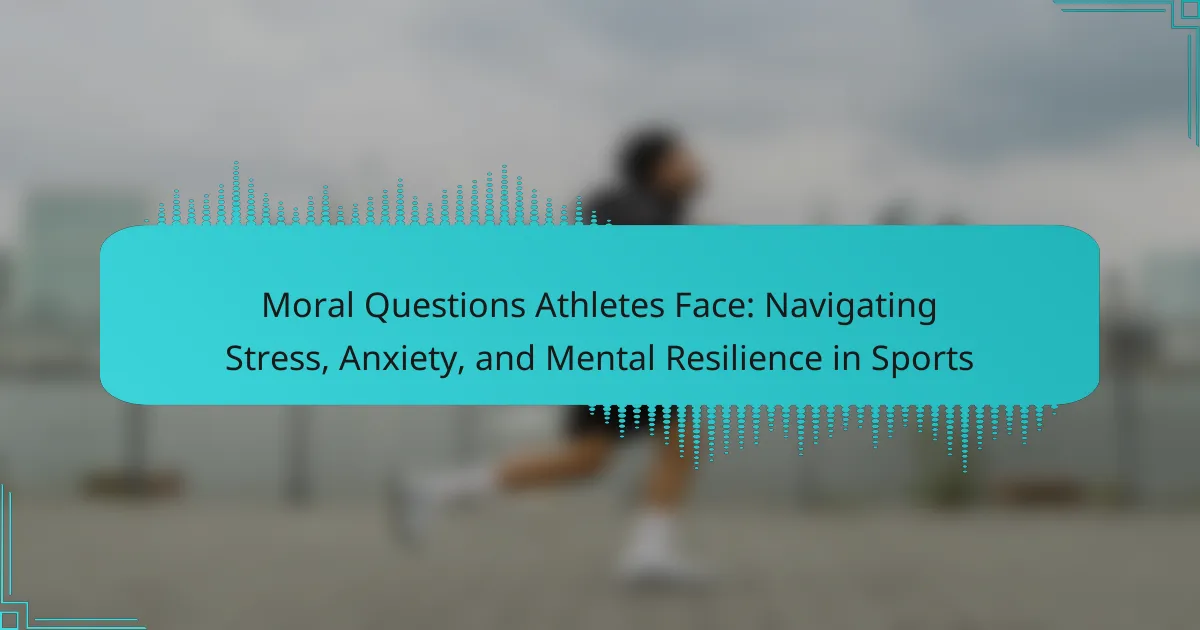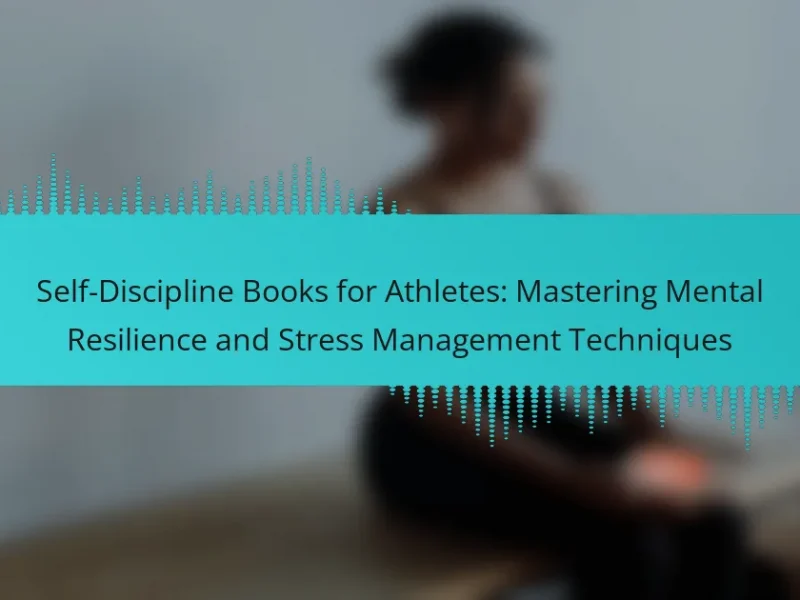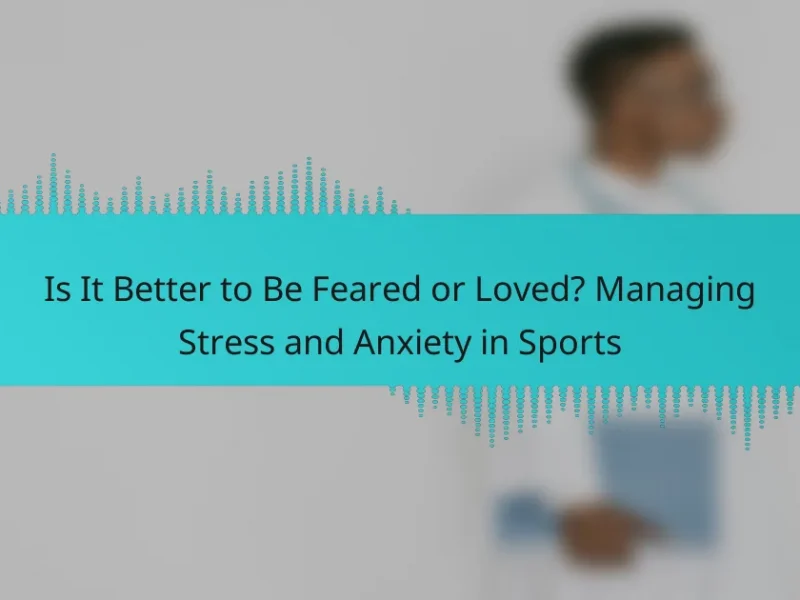Athletes face critical moral questions related to stress, anxiety, and mental resilience. They navigate the pressures of performance while balancing personal well-being and competitive success. Common coping strategies include mindfulness, visualization, and social support. Unique techniques like nature immersion and creative expression also enhance mental health, providing essential tools for resilience in high-pressure sports environments.
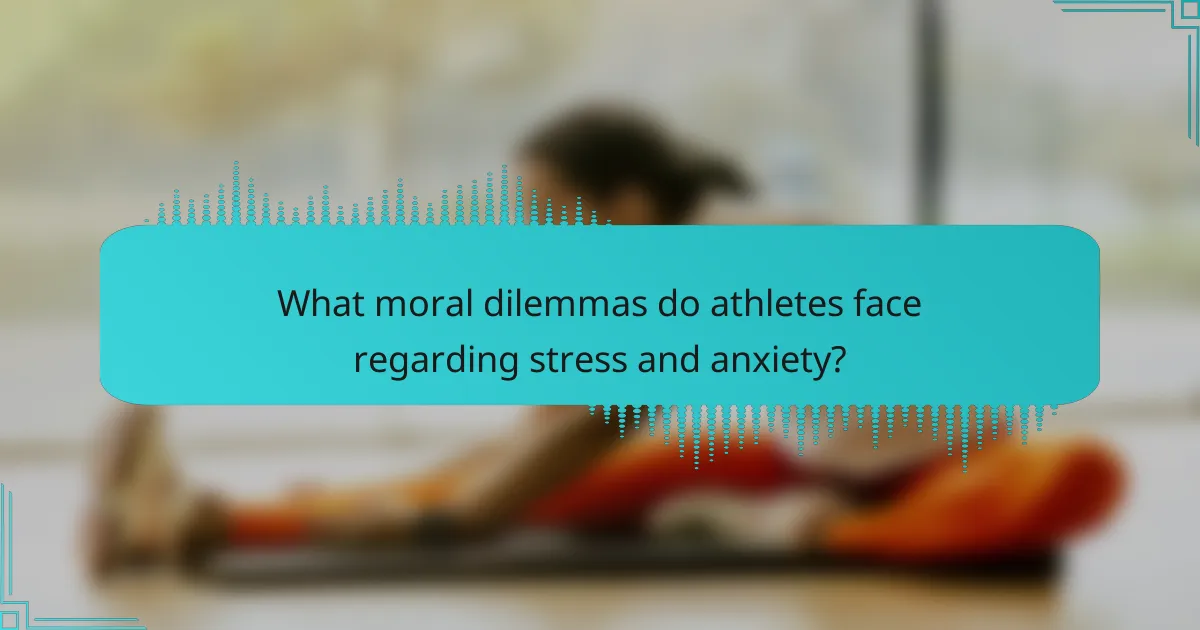
What moral dilemmas do athletes face regarding stress and anxiety?
Athletes face significant moral dilemmas regarding stress and anxiety, impacting their mental resilience. They often struggle with the pressure to perform, which can lead to ethical conflicts between personal well-being and competitive success. For instance, athletes may feel compelled to prioritize winning over mental health, risking burnout or emotional distress. Additionally, they may confront societal expectations that stigmatize mental health issues, making it difficult to seek help. Balancing personal integrity with the demands of competition creates a complex landscape for athletes, influencing their decisions and overall mental health.
How do societal expectations impact athlete mental health?
Societal expectations significantly impact athlete mental health by increasing stress and anxiety levels. Athletes often feel pressured to meet external standards, which can lead to burnout and decreased performance. The expectation to maintain a perfect image can hinder their ability to express vulnerabilities. This pressure may also deter athletes from seeking help, as they fear judgment or loss of status. Ultimately, fostering an environment that prioritizes mental resilience is crucial for addressing these challenges and promoting well-being in sports.
What role does competition play in exacerbating stress?
Competition significantly increases stress for athletes by amplifying pressure to perform. This heightened stress often stems from fear of failure, comparison with peers, and the need to meet expectations. Athletes face unique moral dilemmas when balancing personal integrity with competitive pressures. Studies indicate that 70% of athletes report increased anxiety during competitions, illustrating the pervasive impact of competition on mental resilience. As a result, managing stress becomes essential for maintaining performance and overall well-being.
What are common stressors in competitive sports?
Common stressors in competitive sports include performance pressure, injury concerns, and external expectations. Athletes often face intense scrutiny from coaches, fans, and media, which can heighten anxiety levels. Additionally, balancing training with personal life can create further mental strain. The fear of failure or not meeting set goals serves as a unique attribute contributing to athletes’ stress. As a result, developing mental resilience is crucial for managing these stressors effectively.
How does performance pressure affect athletes’ mental resilience?
Performance pressure can significantly enhance or diminish athletes’ mental resilience. High-pressure situations often lead to increased anxiety, which may undermine an athlete’s performance. However, athletes who effectively manage this pressure can develop greater mental toughness and resilience over time. This unique attribute of resilience enables them to cope with stress more effectively, ultimately improving their performance under pressure. Studies indicate that athletes who embrace challenges and view pressure as an opportunity for growth tend to exhibit stronger mental resilience. As a result, performance pressure can serve as a double-edged sword, shaping athletes’ psychological fortitude in sports.
What unique challenges do athletes encounter in managing anxiety?
Athletes face unique challenges in managing anxiety due to performance pressure, public scrutiny, and mental health stigma. High expectations can lead to fear of failure, exacerbating anxiety. For instance, the pressure to maintain peak performance can create a cycle of stress that impacts mental resilience. Additionally, athletes often lack access to mental health resources, making it difficult to address anxiety effectively. These challenges require tailored strategies to promote well-being and enhance coping mechanisms.
How does injury influence an athlete’s mental state?
Injury significantly impacts an athlete’s mental state, often leading to increased stress and anxiety. Athletes may experience feelings of isolation and uncertainty about their future performance. The psychological toll can hinder recovery, affecting motivation and mental resilience. Research indicates that athletes with strong mental resilience cope better with injuries, maintaining a positive outlook and focus on rehabilitation.
What are the implications of public scrutiny on athlete well-being?
Public scrutiny significantly impacts athlete well-being by increasing stress and anxiety levels. Athletes often face pressure to meet public expectations, leading to mental health challenges. This scrutiny can diminish their mental resilience, as they grapple with the fear of failure and judgment. Research indicates that athletes under constant public observation report higher instances of anxiety and depression, highlighting the need for supportive environments. Addressing these implications is crucial for enhancing athlete mental health and performance.
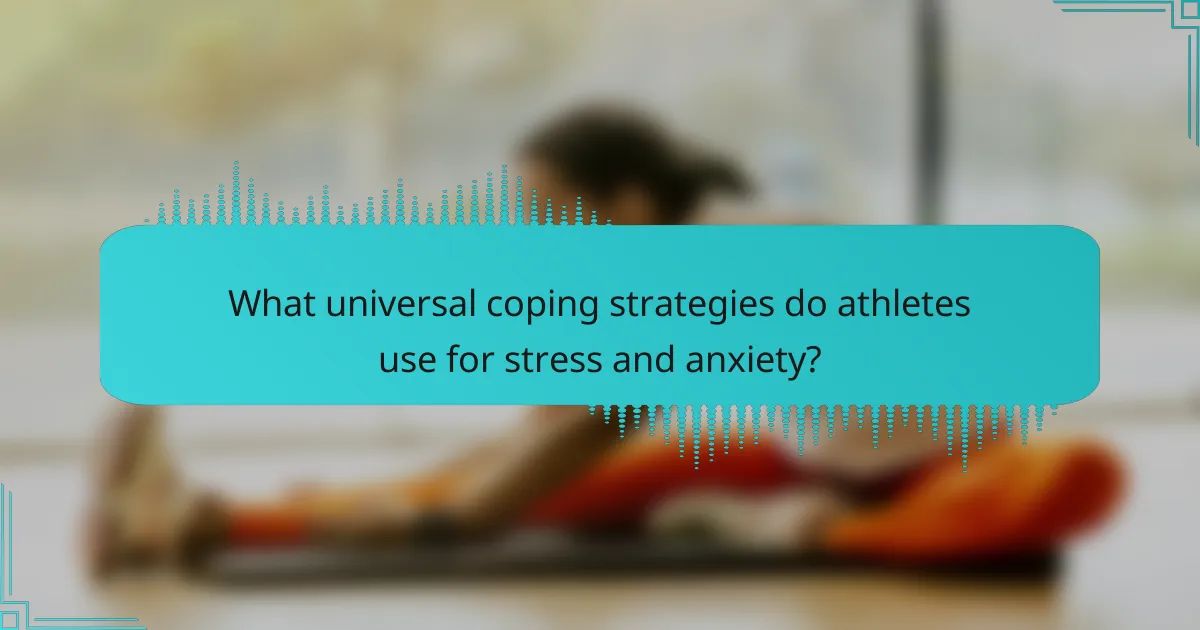
What universal coping strategies do athletes use for stress and anxiety?
Athletes commonly use mindfulness, visualization, and social support as universal coping strategies for stress and anxiety. Mindfulness techniques help athletes stay present, reducing anxiety about performance. Visualization allows them to mentally rehearse successful outcomes, enhancing confidence. Social support from teammates and coaches provides emotional reassurance, fostering resilience. Each strategy contributes to improved mental health, enabling athletes to navigate the pressures of competition effectively.
How can physical training contribute to mental resilience?
Physical training enhances mental resilience by promoting discipline, focus, and stress management. Regular exercise releases endorphins, which reduce anxiety and improve mood. Athletes learn to cope with pressure through consistent training, fostering a growth mindset. This unique attribute of physical training equips athletes with tools to navigate moral dilemmas effectively, enhancing their overall performance and mental fortitude.
What role does team support play in coping mechanisms?
Team support plays a crucial role in athletes’ coping mechanisms by providing emotional stability and shared experiences. Positive reinforcement from teammates fosters resilience, helping athletes navigate stress and anxiety. Studies indicate that social support can enhance mental well-being, leading to improved performance. Additionally, team dynamics create a sense of belonging, which is vital for psychological health.
What are effective communication strategies within teams?
Effective communication strategies within teams include active listening, clear messaging, and regular feedback. These approaches foster collaboration and enhance team dynamics. Active listening ensures all members feel heard, while clear messaging reduces misunderstandings. Regular feedback promotes continuous improvement and mental resilience, crucial for athletes facing stress and anxiety.
How can athletes foster a supportive environment?
Athletes can foster a supportive environment by promoting open communication and empathy among teammates. Encouraging vulnerability allows athletes to share their mental health challenges, reducing stigma. Establishing team rituals or group activities strengthens bonds, creating a sense of belonging. Regular check-ins can help identify stressors, ensuring everyone feels supported.
What mental health resources are available for athletes?
Athletes have access to various mental health resources, including counseling services, support groups, and wellness programs. These resources help address stress, anxiety, and promote mental resilience. Professional organizations often provide tailored mental health support, ensuring athletes can navigate their unique challenges effectively. Access to trained sports psychologists is a unique attribute of these resources, facilitating personalized mental health strategies. Additionally, online platforms offer virtual therapy options, increasing accessibility for athletes.
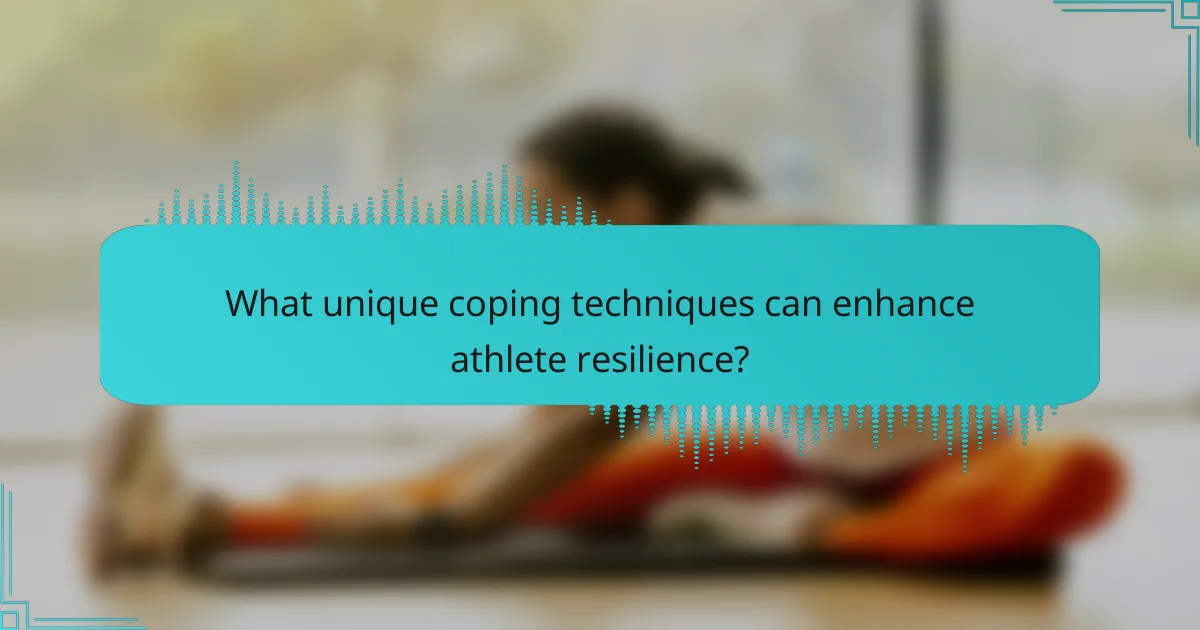
What unique coping techniques can enhance athlete resilience?
Unique coping techniques that enhance athlete resilience include mindfulness practices, cognitive restructuring, and goal-setting strategies. Mindfulness helps athletes remain present, reducing anxiety and improving focus. Cognitive restructuring allows athletes to challenge negative thoughts, fostering a positive mindset. Goal-setting provides clear objectives, enhancing motivation and a sense of purpose. These techniques collectively build mental resilience, essential for navigating the pressures of competitive sports.
How can visualization techniques help manage anxiety?
Visualization techniques can effectively manage anxiety by enhancing focus and promoting relaxation. These methods allow athletes to mentally rehearse performance scenarios, reducing stress and increasing confidence. Techniques such as guided imagery and mental rehearsal have been shown to lower anxiety levels significantly. Research indicates that visualization can activate similar brain pathways as actual performance, thereby improving mental resilience. By regularly incorporating these strategies, athletes can develop a robust coping mechanism against anxiety in high-pressure situations.
What innovative approaches are athletes using to cope with stress?
Athletes are employing innovative approaches like mindfulness, technology integration, and mental health support to cope with stress. Mindfulness practices, such as meditation and breathing exercises, enhance focus and reduce anxiety. Wearable technology tracks physiological responses, helping athletes manage stress levels in real-time. Additionally, mental health professionals provide tailored strategies, fostering resilience and coping mechanisms. These methods reflect a unique shift towards holistic well-being in sports.
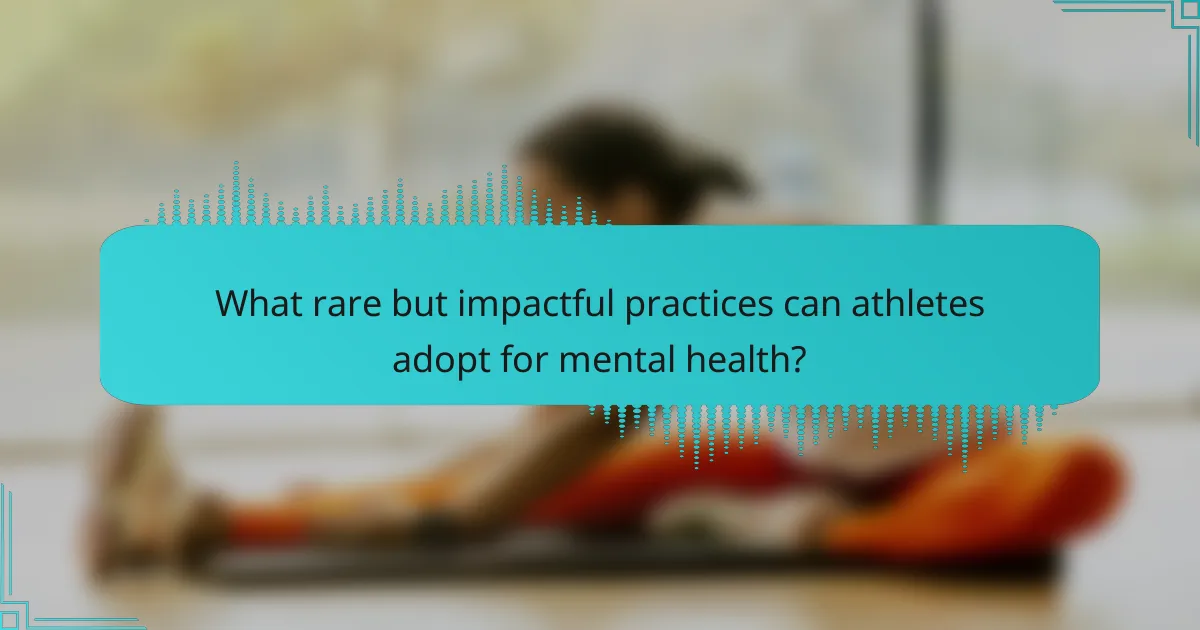
What rare but impactful practices can athletes adopt for mental health?
Athletes can adopt rare but impactful practices like mindfulness, nature immersion, and creative expression for mental health. Mindfulness enhances focus and reduces anxiety. Nature immersion fosters relaxation and rejuvenation. Creative expression provides an outlet for emotions, promoting resilience. These practices uniquely support mental well-being in high-pressure environments.
How does engaging in community service influence athlete well-being?
Engaging in community service positively influences athlete well-being by enhancing mental resilience and reducing stress. Participation fosters a sense of purpose, builds social connections, and promotes emotional stability. Studies show that athletes involved in community service report lower anxiety levels and improved overall mental health. This unique attribute of community service creates a supportive environment that helps athletes navigate the pressures of competitive sports.
What are the benefits of mentorship in athletic mental health?
Mentorship significantly enhances athletic mental health by providing emotional support, guidance, and accountability. Mentors help athletes navigate stress and anxiety, fostering resilience through shared experiences and strategies. Research indicates that athletes with mentors report lower levels of mental distress and improved coping mechanisms. Moreover, mentorship promotes a sense of belonging and community, which is crucial for mental well-being in competitive environments.
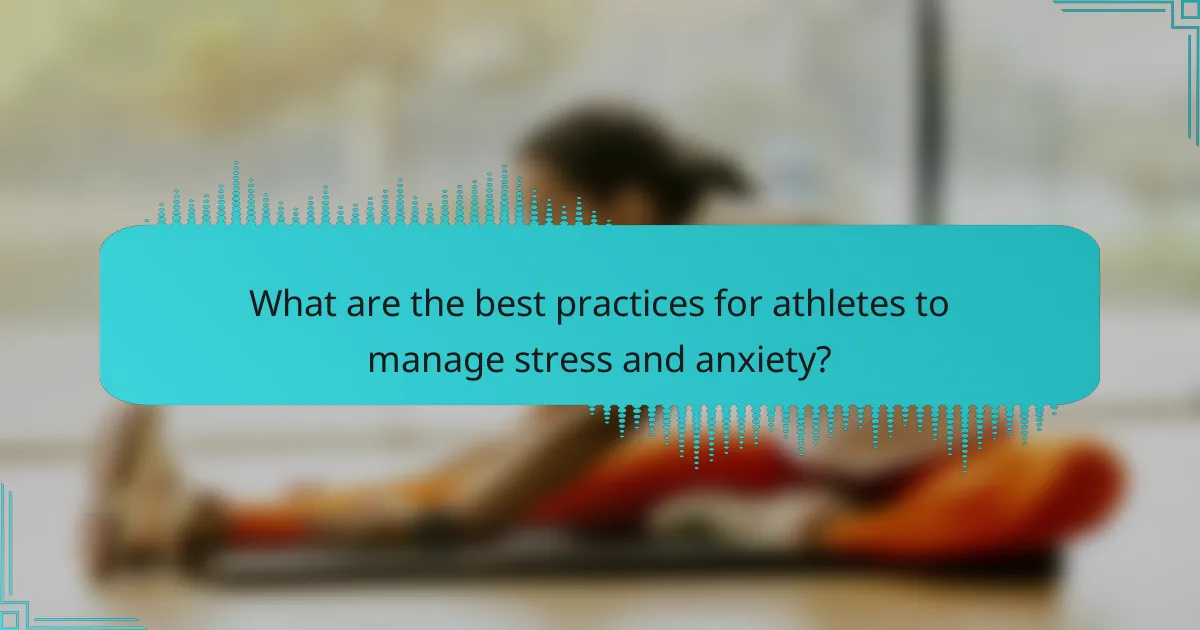
What are the best practices for athletes to manage stress and anxiety?
Athletes can manage stress and anxiety through effective techniques. Key practices include mindfulness, proper time management, and seeking support from coaches or mental health professionals. Mindfulness techniques, such as meditation and deep breathing, enhance focus and reduce anxiety. Time management helps athletes balance training, competition, and personal life, minimizing stress. Building a support network fosters resilience and provides emotional guidance. Regular physical activity also contributes to mental well-being, as it releases endorphins that combat stress.
How can athletes develop a personalized mental health plan?
Athletes can develop a personalized mental health plan by assessing their unique stressors and coping mechanisms. First, identify specific mental health challenges, such as anxiety or burnout. Next, set clear, achievable goals for mental wellness. Incorporate techniques like mindfulness, visualization, and self-reflection. Regularly evaluate progress and adjust the plan based on effectiveness. Seeking professional support can enhance resilience and provide tailored strategies.
What common mistakes should athletes avoid in stress management?
Athletes should avoid common mistakes in stress management, such as neglecting mental health, failing to seek support, and not practicing relaxation techniques. Acknowledging stress is crucial; ignoring it can lead to burnout. Maintaining a balanced routine that includes physical and mental training enhances resilience. Setting realistic goals prevents overwhelming pressure. Engaging in open communication with coaches and teammates fosters a supportive environment. Lastly, athletes should prioritize self-care to sustain long-term performance and well-being.
What expert insights can guide athletes in overcoming mental challenges?
Expert insights for athletes facing mental challenges include developing mental resilience, practicing mindfulness, and seeking support. Mental resilience allows athletes to cope with stress and anxiety effectively. Mindfulness techniques, such as meditation, enhance focus and reduce negative thoughts. Seeking support from coaches, teammates, or mental health professionals fosters a healthy mindset. These strategies help athletes navigate moral questions and maintain performance under pressure.
